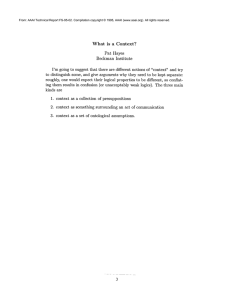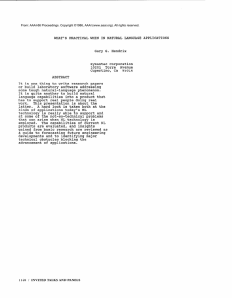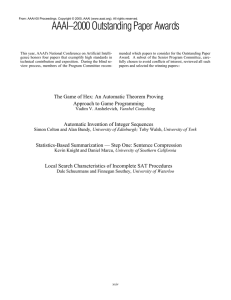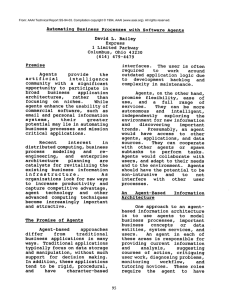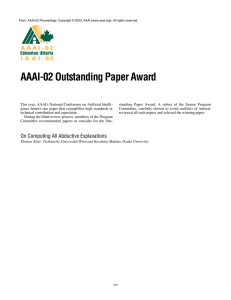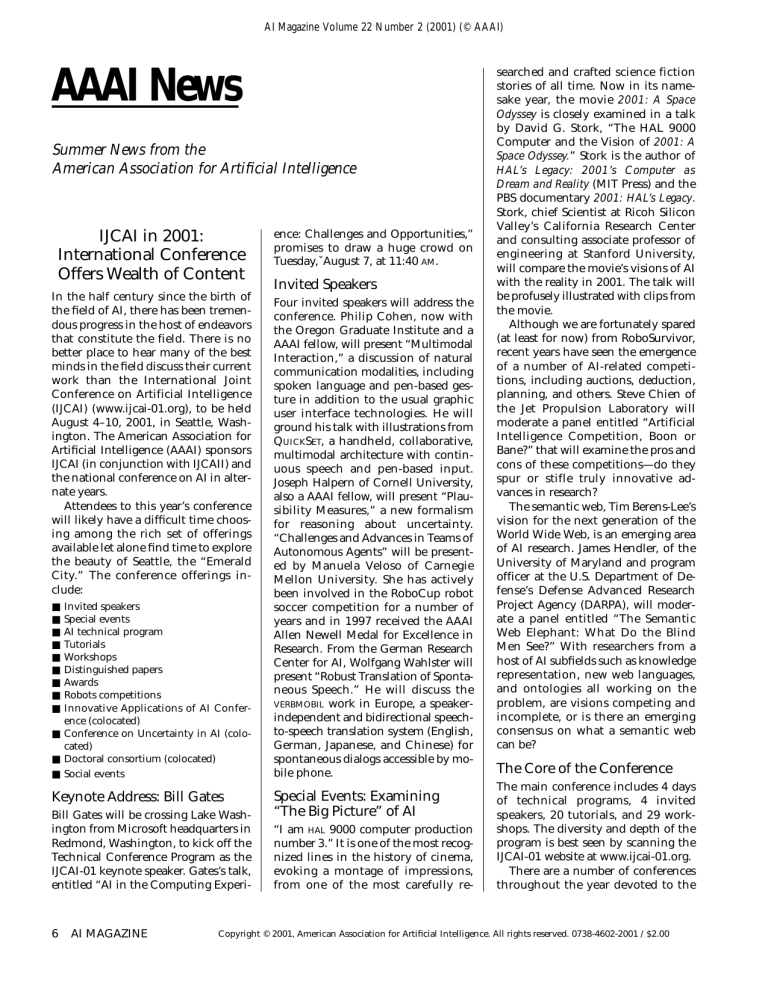
AI Magazine Volume 22 Number 2 (2001) (© AAAI)
AAAI News
Summer News from the
American Association for Artificial Intelligence
IJCAI in 2001:
International Conference
Offers Wealth of Content
In the half century since the birth of
the field of AI, there has been tremendous progress in the host of endeavors
that constitute the field. There is no
better place to hear many of the best
minds in the field discuss their current
work than the International Joint
Conference on Artificial Intelligence
(IJCAI) (www.ijcai-01.org), to be held
August 4–10, 2001, in Seattle, Washington. The American Association for
Artificial Intelligence (AAAI) sponsors
IJCAI (in conjunction with IJCAII) and
the national conference on AI in alternate years.
Attendees to this year’s conference
will likely have a difficult time choosing among the rich set of offerings
available let alone find time to explore
the beauty of Seattle, the “Emerald
City.” The conference offerings include:
■
■
■
■
■
■
■
■
■
Invited speakers
Special events
AI technical program
Tutorials
Workshops
Distinguished papers
Awards
Robots competitions
Innovative Applications of AI Conference (colocated)
■ Conference on Uncertainty in AI (colocated)
■ Doctoral consortium (colocated)
■ Social events
Keynote Address: Bill Gates
Bill Gates will be crossing Lake Washington from Microsoft headquarters in
Redmond, Washington, to kick off the
Technical Conference Program as the
IJCAI-01 keynote speaker. Gates’s talk,
entitled “AI in the Computing Experi-
6
AI MAGAZINE
ence: Challenges and Opportunities,”
promises to draw a huge crowd on
Tuesday,ˇAugust 7, at 11:40 AM.
Invited Speakers
Four invited speakers will address the
conference. Philip Cohen, now with
the Oregon Graduate Institute and a
AAAI fellow, will present “Multimodal
Interaction,” a discussion of natural
communication modalities, including
spoken language and pen-based gesture in addition to the usual graphic
user interface technologies. He will
ground his talk with illustrations from
QUICKSET, a handheld, collaborative,
multimodal architecture with continuous speech and pen-based input.
Joseph Halpern of Cornell University,
also a AAAI fellow, will present “Plausibility Measures,” a new formalism
for reasoning about uncertainty.
“Challenges and Advances in Teams of
Autonomous Agents” will be presented by Manuela Veloso of Carnegie
Mellon University. She has actively
been involved in the RoboCup robot
soccer competition for a number of
years and in 1997 received the AAAI
Allen Newell Medal for Excellence in
Research. From the German Research
Center for AI, Wolfgang Wahlster will
present “Robust Translation of Spontaneous Speech.” He will discuss the
VERBMOBIL work in Europe, a speakerindependent and bidirectional speechto-speech translation system (English,
German, Japanese, and Chinese) for
spontaneous dialogs accessible by mobile phone.
Special Events: Examining
“The Big Picture” of AI
“I am HAL 9000 computer production
number 3.” It is one of the most recognized lines in the history of cinema,
evoking a montage of impressions,
from one of the most carefully re-
searched and crafted science fiction
stories of all time. Now in its namesake year, the movie 2001: A Space
Odyssey is closely examined in a talk
by David G. Stork, “The HAL 9000
Computer and the Vision of 2001: A
Space Odyssey.” Stork is the author of
HAL’s Legacy: 2001’s Computer as
Dream and Reality (MIT Press) and the
PBS documentary 2001: HAL’s Legacy.
Stork, chief Scientist at Ricoh Silicon
Valley’s California Research Center
and consulting associate professor of
engineering at Stanford University,
will compare the movie’s visions of AI
with the reality in 2001. The talk will
be profusely illustrated with clips from
the movie.
Although we are fortunately spared
(at least for now) from RoboSurvivor,
recent years have seen the emergence
of a number of AI-related competitions, including auctions, deduction,
planning, and others. Steve Chien of
the Jet Propulsion Laboratory will
moderate a panel entitled “Artificial
Intelligence Competition, Boon or
Bane?” that will examine the pros and
cons of these competitions—do they
spur or stifle truly innovative advances in research?
The semantic web, Tim Berens-Lee’s
vision for the next generation of the
World Wide Web, is an emerging area
of AI research. James Hendler, of the
University of Maryland and program
officer at the U.S. Department of Defense’s Defense Advanced Research
Project Agency (DARPA), will moderate a panel entitled “The Semantic
Web Elephant: What Do the Blind
Men See?” With researchers from a
host of AI subfields such as knowledge
representation, new web languages,
and ontologies all working on the
problem, are visions competing and
incomplete, or is there an emerging
consensus on what a semantic web
can be?
The Core of the Conference
The main conference includes 4 days
of technical programs, 4 invited
speakers, 20 tutorials, and 29 workshops. The diversity and depth of the
program is best seen by scanning the
IJCAI-01 website at www.ijcai-01.org.
There are a number of conferences
throughout the year devoted to the
Copyright © 2001, American Association for Artificial Intelligence. All rights reserved. 0738-4602-2001 / $2.00
AAAI News
various subfields that make up the
whole of AI. IJCAI attendees will have
an opportunity to hear presentations
of some of the most distinguished recent papers from international conferences in robotics, vision, knowledge
representation, machine learning,
planning and other areas that are selected for IJCAI and specially tailored
for a general AI audience.
Colocated with IJCAI this year is the
Conference on Uncertainty in AI 2001
(robotics.stanford.edu/~uai01/). This
conference focuses on the theoretical
advances and latest applied developments of principled uncertain reasoning methods in intelligent systems,
such as Bayesian networks.
Robots
One of the highlights of the summer AI
conference is always the robot competition and exhibition. This year combines two different competitions in diverse tests for robots of all sizes from
many of the premier robot research
labs around the world. Robocup
(www.cs.cmu.edu/~robocup 2001/),
the soccer competition for virtual,
small, and medium robot teams, will
once again be collocated with IJCAI.
AAAI sponsors the Mobile Robot Competition (www.cs.cmu.edu/~aaai 00)
and Exhibit. This year, the Search and
Rescue event will be a joint event between the Robocup and Mobile Robot
competitions, and once again, the mobile robots will serve hors d’oeuvres.
The ingenuity and humor exhibited in
the Hors d’Oeuvres event is always a
crowd pleaser. Encouraging young talent, this summer, IJCAI will also host
the National Botball Tournament
(www.botball.com) for robots built by
middle and high school students
(www.botball.com).
Innovative Applications of AI
Colocated with IJCAI is the Thirteenth
Annual Conference on Innovative Applications of AI (IAAI-2001) (www.
aaai.org/conferences/IAAI/2001/iaai01
.hˇml), which recognizes cutting-edge
applications—both deployed and still
under development—that employ AI
techniques. Deployed application
winners include an Internet search engine that returns databases, from Terra
Lycos (U.S.); a transportation logistics
planning and scheduling system for
the U.S. Marine Corps (U.S.); intelligent agent military simulation system
for the Australian Defense Force (Australia); an advisory system for
grasshopper infestation management
for the Wyoming Department of Agriculture (U.S.), a NASA science mission
planning system for a radar satellite
over Antarctica, from the Jet Propulsion Laboratory (U.S.); a web-based
natural language sales assistant, from
IBM T.J. Watson Research Center
(U.S.); and a mortgage deal–structuring advisory system, from American
Business Financial Services (U.S.).
Winners for emerging applications
still under development include
■ Integration of case-based reasoning with
image analysis for high-throughput protein crystallization, from the Ontario
Cancer Institute (Canada)
■ A context-sensitive text corrector that
fixes spelling errors, from the University
of Illinois at Urbana/Champaign (U.S.)
■ An intelligent agent system with automated learning and adapting for personalized web searching, from Kyushu University (Japan),
■ A constraint-based system for diagnosis
of interoperability problems in asynchronous transfer mode networks
■ “Electric elves” (agents) that support
routine office tasks (for example,
scheduling meetings) across a variety of
office machines and communication devices, from University of Southern California Information Sciences Institute
and Computer Science Department
(U.S.)
■ In-the-air flight-control system, from
ENAC/LOG & CENA/LOG (France)
■ A multidomain information-extraction
system, from Thales/LCR (France).
Winners will present their papers during the conference (August 7–9). IAAI
is sponsored by AAAI.
Honors for AI Researchers
Three awards will be given during the
conference, recognizing major contributions in the field. First, the recipient
of the IJCAI-01 Award for Research Excellence is Donald Michie, professor
emeritus of machine intelligence at
the University of Edinburgh (Scotland). Second, the IJCAI Computers
and Thought Award for outstanding
young AI scientist is being given to
Daphne Koller, assistant professor in
the Computer Science Department at
Stanford University (U.S.). Third, the
Donald E. Walker Distinguished Service Award honors Barbara Grosz, Gordon McKay professor for computer science at Harvard University (U.S.) for
her contributions to AI and service to
the field. Each award recipient will
present a talk at the conference.
IJCAI is sponsored by AT&T Labs,
Boeing, Interprice Technologies, Microsoft, and NEC Research. IJCAI 2003
is slated for Acapulco, Mexico.
For registration information, go to
www.ijcai-01.org.
Time to Socialize and Explore
IJCAI is never all work and no play.
Planned events include the conference
opening reception to be held at the
Museum of Flight where the AI community can schmooze on Air Force
One and the rest of the museum’s 54
historic airplanes. The conference
banquet will take attendees across the
Puget Sound to beautiful Blake Island’s
Tillicum Village for a taste of the food,
sights, and sounds of Northwest Coast
Native Americans and the natural
beauty of the island, including sweeping views across to the sparkling Seattle skyline. For those who want to explore Seattle and surrounds, there are
endless possibilities.
We hope to see you at IJCAI in Seattle this August.
AAAI Annual
Business Meeting
The annual business meeting of the
American Association for Artificial Intelligence will be held at 12:45 PM,
Wednesday, August 8, 2001, in the
Washington State Convention and
Trade Center in Seattle, Washington.
Artificial Intelligence Journal
Online Access
This new benefit for regular members
has now been in place for six months.
If you have not had a chance to visit
the Artificial Intelligence Journal’s web
site, we urge you to do so. AAAI regular members can view and browse tables of contents, view articles published in recent issues of AI Journal,
and use the current features available
through Elsevier’s electronic journal
SUMMER 2001 7
AAAI News
service. They can also view, print,
and/or download excerpts of reasonable quantity, provided that the use of
such excerpts is personal and does not
amount to, or result in, commercial
distribution. Participation in this experimental program is included in
your normal AAAI membership dues.
If you have not received your reader
key to enjoy this benefit, please write
to us at membership@aaai.org for
more information.
NEW!!
AI ALERT Newsletter
Many of you have received the first
few issues of the AI ALERT newsletter,
which highlights selected features
from the AI in the News section of the
AAAI Pathfinder/AI Topics web pages.
This new service keeps you informed
of what has been written on AI in the
press within the past few weeks. If you
would like to receive this newsletter,
please write to us at membership@
aaai.org for instructions on how to
subscribe to the AAAI members e-mail
list. We also welcome your feedback
on the newsletter at aitopics@aaai.org.
Be sure to visit the AI Topics web site at
aitopics@aaai.org.
AAAI Executive Council
Nominations
Every year four new councilors are
elected to serve three-year terms on
the AAAI Executive Council. The
Nominating Committee encourages
all regular members in good standing
to place an individual’s name before
them for consideration. The Nominating Committee, in turn, will nominate
eight candidates for councilor in the
spring. In addition to members’ recommendations, the committee will
actively recruit individuals to provide
a balanced slate of candidates. AAAI
members will vote in the late spring of
2002.
To submit a candidate’s names for
consideration, please send the individual’s name, address, phone number,
and e-mail address to Carol Hamilton,
Executive Director, AAAI, 445 Burgess
Drive, Menlo Park, CA 94025; by fax to
8
AI MAGAZINE
650/321-4457; or by e-mail to hamilton@aaai.org. Nominators should contact candidates prior to submitting
their names to verify that they are willing to serve, should they be elected.
The deadline for nominations is
November 1, 2001.
2001 AAAI
Fall Symposium Series
The 2001 AAAI Fall Symposium Series
will be held Friday through Sunday,
November 2–4, 2001 at the Sea Crest
Conference Center in North Falmouth, Massachusetts. The titles of
the five symposia in the 2001 Fall
Symposia Series are
■
Anchoring Symbols to Sensor Data in
Single- and Multiple-Robot Systems
Cochairs: Silvia Coradeschi (Silvia. Coradeschi@aass.oru.se) and Alessandro Saffiotti www.aass.oru.se/Living/FSS01/
■
Emotional and Intelligent II: The Tangled Knot of Social Cognition
Chair: Lola D. Canamero (lola@lri.fr)
www.lri.fr/~lola/ei-fs01.html
■
Intent Inference for Collaborative Tasks
Chair: Benjamin Bell (benjamin.l.bell@
lmco.com)
■
Negotiation Methods for Autonomous
Cooperative Systems
Chair: Costas Tsatsoulis (tsatsoul@ittc.
ukans.edu)
■
Using Uncertainty within Computation
Cochairs: Carla Gomes (gomes@cs.cornell. edu) and Toby Walsh (tw@cs.york.
ac.uk)
9400 for reservations, and be sure to
identify yourself as an attendee at the
American Association for Artificial Intelligence Fall Symposium Series.
2002 Spring
Symposium Series
The 2002 Spring Symposium Series
will be held March 25–27, 2002, at
Stanford University. The Call for Participation will be available in July on
the AAAI web site (www.aaai.org/Symposia/symposia.html) and will be
mailed to all AAAI members. The tentative list of topics is as follows:
■
AI and Games
Chair: Kenneth Forbus (forbus@northwestern.edu)
■
Collaborative Learning Agents
Cochairs: Kagan Tumer (kagan@ptolemy.arc.nasa.gov) and Peter Stone
(pstone@research.att.com)
■
Intelligent Distributed and Embedded
Systems
Cochairs: Gaurav S. Sukhatme
(gaurav@robotics.usc.edu) and Tucker
Balch (trb@ux7.sp.cs.cmu.edu)
■
Knowledge and Information Aggregation for Intelligent Decision Making
over Time
Chair: Kai F. Goebel
(goebelk@crd.ge.com)
■
Logic-Based Program Synthesis: Stateof-the-Art and Future Trends
Cochairs: Doug Smith
(smith@kestrel.edu) and Bernd Fisher
■
Mining Answers from Texts and Knowledge Bases
Cochairs: Sanda Harabagiu
(sanda@seas.smu.edu) and Vinay
Chaudhri (vinay.chaudhri@sri.com)
■
Safe Learning Agents
Cochairs: Mike Barley (barley@cs.auckland.ac.nz) and Hans Guesgen
(hans@cs.auckland.ac.nz)
■
Sketch Understanding
Chair: Tom Stahovich (stahov@andrew.cmu.edu)
■
Theory for Information-Access Systems:
Application for Theories of Knowledge
Chair: Pentti Kanerva
(pkanerva@csli.stanford.edu)
www.cs.york.ac.uk/~tw/fall
Symposia will be limited to 40 to 60
participants each. In addition to invited participants, a limited number of
other interested parties will be able to
register in each symposium on a firstcome, first-served basis. Complete registration and hotel information will be
available in July by request from
fss@aaai.org or on the AAAI web site at
www.aaai.org/Symposia/symposia.ht
ml. Invited participants must register
by September 7, and the final registration deadline is September 21. The
deadline for hotel reservations at the
Sea Crest is October 1, 2001. The discounted single-double room rate of
$84.00 per night might not be available after this date. Please call the Sea
Crest at 1- 800-225-3110 or 1-508-540-
AAAI/IAAI-2002
The Calls for Participation for the
Eighteenth National Conference on
Artificial Intelligence (AAAI-2002) and
AAAI News
ADVANCES IN
DISTRIBUTED AND PARALLEL
KNOWLEDGE DISCOVERY
Edited by Hillol Kargupta and Philip Chan
K
nowledge discovery and data mining (KDD) deals with the problem of
extracting interesting associations, classifiers, clusters, and other patterns
from data. The emergence of network-based distributed computing environments has introduced an important new dimension to this problem—distributed
sources of data. Distributed knowledge discovery (DKD) works with the merger of
communication and computation by analyzing data in a distributed fashion. This
technology is particularly useful for large heterogeneous distributed environments
such as the Internet, intranets, mobile computing environments, and sensor networks. When the datasets are large, scaling up the speed of the KDD process is crucial. Parallel knowledge discovery (PKD) techniques addresses this problem by using
high-performance multi-processor machines. This book presents introductions to
DKD and PKD, extensive reviews of the field, and state-of-the-art techniques.
PUBLISHED BY THE AAAI PRESS / COPUBLISHED BY THE MIT PRESS
Five Cambridge Center, Cambridge, Massachusetts 02142 USA
http://mitpress.edu/ • 617-625-8569 • 800-356-0343
ISBN 0-262-61155-4, 472 pp., illus., bibliography, index
SUMMER 2001 9
AAAI News
the Fourteenth Innovative Applications of Artificial Intelligence Conference (IAAI-2002) will be mailed to all
AAAI members in mid-July and will also be available on the AAAI web site
(www.aaai.org). AAAI-02 and IAAI-02
will be held in Edmonton, Alberta,
Canada, July 28–August 1. The program cochairs for AAAI-02 are Rina
Dechter, University of California at
Irvine (dechter@ics.uci.edu) and
Richard Sutton, AT&T Labs Research
(sutton@research.att.com). The Conference Chair for IAAI-02 is Steve
Chien, Jet Propulsion Laboratory
(chien@aig.jpl.nasa.gov).
AAAI is delighted to welcome two
collocated conferences in 2002:
■
The Eighth ACM SIGKDD International
Conference on Knowledge Discovery
and Data Mining (KDD-02)
■
The Tenth International Conference on
Intelligent Systems for Molecular Biology
For further information, please contact AAAI at 650/328-3123 or by email at ncai@aaai.org.
AAAI Member News
The Computing Research Association
announced that two AAAI members
have been elected to serve three-year
terms on their Board of Directors, beginning July 1, 2001. Barbara Grosz of
Harvard University will serve as an
academic representative, and Dave
Waltz of NEC Research will serve as a
lab representative.
Geoffrey E. Hinton has been chosen
as the first recipient of the David E.
Rumelhart Prize, sponsored by the
Glushko-Samuelson Foundation and
the Cognitive Science Society for contributions to the formal analysis of human cognition. Hinton was chosen for
his many important contributions to
the analysis of neural networks, elucidating the nature of representation,
processing, and learning in the brain.
Hinton will receive the prize and deliver the first Rumelhart Prize Lecture
in Edinburgh, Scotland, at the Annual
Meeting of the Cognitive Science Society, to be held August 1–4 in Edinburgh, Scotland. The Prize itself will
consist of a certificate, a citation of the
awardee’s contribution, and a monetary award of $100,000.
10
AI MAGAZINE
Geoffrey Hinton received his B.A. in
experimental psychology from Cambridge in 1970 and his Ph.D. in Artificial Intelligence from Edinburgh in
1978. He did postdoctoral work at Sussex University and the University of
California at San Diego and spent five
years as a faculty member in the Computer Science Department at CarnegieMellon University. He then moved to
Toronto where he was a fellow of the
Canadian Institute for Advanced Research and a professor in the Computer Science and Psychology departments. He is a former president of the
Cognitive Science Society, and he is a
fellow of the Royal Society (UK), the
Royal Society of Canada, and the
American Association for Artificial Intelligence. In 1992, he won the ITAC/
NSERC award for contributions to information technology. Hinton is currently director of the Gatsby Computational Neuroscience Unit at
University College London.
AAAI Executive
Council Meeting Minutes
The meeting was held March 25, 2001,
in Palo Alto, California. Attending:
Bruce Buchanan, Daniel Bobrow,
Robert Engelmore, Tim Finin, Ken
Ford, Barbara Grosz, Pat Hayes, Henry
Kautz, Deborah McGuinness, Tom
Mitchell, David Poole, Paul Rosenbloom, Bart Selman, Reid Simmons,
Manuela Veloso, David Waltz, Carol
Hamilton, Mike Hamilton
Bruce Buchanan called the meeting
to order at 1:00 PM.
New Business (Part One)
To accommodate the schedule of the
Council’s first guest, one item of new
business was moved just prior to the
standing committee reports. The rest
of the new business can be found in
the last section of these minutes.
AAAI Publication for the Lay Public:
Bruce Buchanan welcomed Chris
Leach of Forbes Custom Communications Partners, who presented a proposal for the launch of a new periodical aimed at 18–35 year olds, high
school math and science teachers, and
the media. Leach provided an
overview of a consumer-oriented mag-
azine covering AI topics. The goal of
the magazine was to increase public
acceptance and awareness of AI, increase the stature of AAAI as the source
for information about the field, increase the level of funding for AI research, and increase the number of
young people seeking careers in AI.
The magazine, which would have to
be largely subsidized by AAAI, required a first-year commitment of
$800,000 to $1,600,000. Some sponsorships or advertising were considered possible to defray about a quarter
of these costs. Leach recommended a
market survey to determine the viability of the venture. Cost for the market
survey was estimated at $50,000 to
$200,000, depending on its scope. A
decision was deferred until later in the
meeting.
Standing Committee Reports
Finance/Membership
Secretary/Treasurer Norm Nielsen
submitted a written report because he
was unable to attend the meeting. He
noted that the membership dues continue to support the AI Magazine and
that the national conference is now
subsidized in many areas by AAAI.
The addition of new features to the
conference without any increase in
conference registration fees has resulted in a $100,000 subsidy. Other
program cost centers essentially break
even. The operating expenses for the
association and all the grant activity
are covered by interest income from,
and sales of, AAAI investments. AAAI
continues to have three investment
managers for its portfolio, divided into 35-percent fixed-income investments and 65-percent common
stocks. Nielsen warned that the market value of the AAAI portfolio had
shown a decline for the first time in
five years.
Conference
Conference Committee Chair Paul
Rosenbloom noted that there was little AAAI activity to report because IJCAI will be held in North America this
year. He did report that IAAI, the
Robot Competition, and the SIGART/
AAAI Doctoral Consortium program
will be held at IJCAI-01 in Seattle. IAAI
submissions remained about even,
and 14 papers—7 deployed and 7
AAAI News
emerging—were accepted for presentation at the conference. The IJCAI
technical program fee will include attendance at IAAI. The Robot Competition and Exhibition will cooperate
with RoboCup this year, cohosting the
Search and Rescue competition and
the exhibition. The Robot Competition is being subsidized by AAAI and a
grant from DARPA as well as several
smaller donations. The Doctoral Consortium submissions doubled this
year, and 14 were accepted. This program is subsidized through a grant
from the National Science Foundation, SIGART, and AAAI.
Rosenbloom noted that the plans
for a revamped technical program at
AAAI-02 were continuing. The technical papers will be presented in poster
format. A general plenary session, featuring invited talks and selected technical presentations, will run throughout each day. The Council encouraged
the Conference Committee to gather
extensive feedback after the 2002 conference to gauge how well this new
format was received. Because AAAI
will cosponsor IJCAI in 2003, the committee will have ample time to decide
whether to continue with the new
poster format in 2004, or return to
technical paper sessions.
Rosenbloom also noted that he will
be reviewing AAAI’s Conference and
Workshop Support Program guidelines
during the coming months, along
with other members of the AAAI
Grants Committee, to see if there are
any recommended changes. The latest
guidelines were adopted in July 1999.
Carol Hamilton reported that IJCAI01 received 796 submissions, and 197
papers were accepted. It was noted that
submissions were down from previous
years, and this was attributed in part to
the early submission deadline of January 9. The Council encouraged the
Conference Committee to keep this in
mind when setting the date for the
AAAI-02 technical paper submission
deadline. In addition, AAAI will research its records to compare the authors who submitted to IJCAI in 1999
versus 2001. A follow-up survey may
be necessary to determine which factors are key in an author’s decision to
submit to AAAI or IJCAI.
Fellows/Nominating
Dave Waltz, past president and chair
of the Fellows Selection Committee
and the Nominating Committee reported that both committees were in
the midst of their selection processes.
The Fellows Committee received 32
nominations this year, including 22
unsuccessful nominations from 1999
and 2000, as well as 10 new ones for
2001. The Nominating Committee
had selected a candidate for PresidentElect, Ron Brachman, and 8 candidates to run for councilor. Of these,
four will be elected to three-year
terms. A ballot will be mailed to all
regular members in May.
Awards
Dave Waltz reported that there had
been little activity in this area because
awards are not presented in IJCAI
years. Carol Hamilton reported that
AAAI is continuing to sponsor 15
$1,000 awards at the Intel International Science and Engineering Fair, to be
held May 8–10 in San Jose. Carol asked
for a volunteer to replace Mel Montemerlo as the coordinator of the judging this year. Reid Simmons agreed to
do this.
Membership
Membership Chair Reid Simmons reported that the Membership Committee had reviewed the feedback from
the 2000 membership survey as well as
the practices of several other engineering societies. The committee made
several recommendations for ways to
possibly increase membership in
AAAI, including more benefits, increased public relations, and community building. Along these lines, the
Council asked the Membership Committee to follow up on two items in
particular, a monthly electronic newsletter and the formation of local chapters. A monthly newsletter, based on
the AI Topics web site, might be a possibility. In addition, Simmons will circulate a local chapter proposal to the
Council prior to the next meeting.
Publications
Publications Chair Ken Ford reported
that AI Magazine articles have been
submitted or invited for the next two
issues and that the winter issue will
have a special guest editor, James
Lester. The scanning project for the
back issues of the magazine is virtually
complete, and all but a few articles are
now available on the web.
AAAI Press has three new books in
production, which are scheduled for
release at IJCAI-01. In addition, three
earlier titles have been reprinted. Ford
stressed the importance of recruiting
good ideas for books, and enlisted the
Council help in doing so.
The Council was asked to discuss
and reaffirm the current policy of the
AAAI, recommended by the Publications Committee, regarding the electronic distribution of proceedings papers. The stabilization of the policy
will allow the AAAI Press to fully investigate and develop electronic distribution of AAAI publications with other vendors and publishing partners.
The current policy states that access to
AAAI proceedings table of contents
and abstracts will be made freely available and that access to the full text of
papers will be restricted to AAAI members, sometimes after an appropriate
waiting period agreeable to our copublisher, The MIT Press. The Council voted in favor of reaffirming this policy
for a period of at least two years, after
which time the Publications Committee will review it and make any needed
recommendations.
Grants
Grants Chair Manuela Veloso reported
that $124,624 had been awarded in
grants since August 1, 2001, with an
additional $307,263 committed for
the remainder of the calendar year.
Grants support independent workshops and conferences, women and
minority programs, several national
conference programs, the student
scholar program, awards and fellows
programs, and miscellaneous special
project requests. Of particular note in
this final category is AAAI’s new subsidy for electronic access for AAAI
members to the AI Journal.
Symposium
Carol Hamilton reported that the
search is still under way for a new associate chair for the Symposium Committee, and asked for a volunteer.
David Poole agreed to take on this responsibility. The 2000 Fall Symposium
was held in North Falmouth, Massachusetts. Each of the five symposia
had an average attendance of 36 people, slightly down from the previous
SUMMER 2001 11
AAAI News
year. The Fall Symposium will return
to the same site in 2001 but will seek
an alternate site in 2002. The 2001
Spring Symposium had seven symposia, and the preregistration figures
were up by about 10 percent from
2000.
Old Business
International Organization
Barbara Grosz reported that the committee charged with investigating the
possibility of forming an international
organization had reached two conclusions: (1) the process needed to involve
as many national societies as possible
and 2) there should be a meeting of the
leaders of these societies at IJCAI-01 to
discuss what the goals and purpose of
the international organization might
be. Grosz also encouraged the Council
to consider what AAAI might be willing to offer to an international organization. The Council voted in favor of
sponsoring the meeting at IJCAI-01.
Grosz agreed to bring feedback to the
Council from that meeting so that
they can decide what role AAAI would
play in the organization.
DARPA Recruitment
Bruce Buchanan reported on behalf of
Jim Hendler that DARPA was in need
of good AI representatives. Currently,
there is no mechanism in place to
identify potential candidates for these
positions. The Council suggested that
the President-Elect should take this on
as a permanent function.
CRA Report
Tim Finin reported that two members
of the AI community were elected to
the CRA Board of Directors in 2000,
including Bill Woods and Kathy McKeown. Dave Waltz also joined the
board after a seat was vacated. Dave
Waltz, Barbara Grosz, and Jeff Bradshaw have been nominated to run this
year. Finin also reported that the CRA
sponsored an Academic Careers and
Effective Teaching Workshop this winter for faculty and advanced graduate
students in computer science and other computer-related disciplines. The
CRA recently announced the recipients of the CRA Outstanding Undergraduate Awards. Two of the four recipients were AI students. Tim will
present the award to the Outstanding
Female Undergraduate, Lisa Anthony,
12
AI MAGAZINE
at IJCAI-01. Other awards were presented at ACM1. The CRA has instituted an NSF-sponsored Digital Government Fellowship Program that is
designed to build ties between the academic computing community and information technology workers in federal, state, and local governments.
Several members of the AAAI community have been nominated as fellows
for this project, and additional suggestions can be sent to Tim at finin@umbc.edu. For more information about
the CRA and its many programs,
please visit www.cra.org.
Please
Join Us
for the
AAAI Annual
Meeting!
New Business
Consumer Publication Proposal Vote
The Council resumed its discussion of
this proposal. Bruce Buchanan
stressed that the main purpose of this
publication should be outreach, both
to educate the lay public and increase
interest in the field. There was some
concern about whether a commercial
publication was an appropriate
method for this. A lengthy discussion
was held about how to reach the
same audience through alternate
methods, including the web, a
newsletter, or increased public relations. The Council did not approve
the creation of this new publication
or the market survey but encouraged
Buchanan to continue discussions
with Forbes about alternatives.
Botball Proposal
The KISS Institute, which organizes
the National Botball Tournament, submitted a proposal for a more formalized link between AAAI and Botball.
Specifically, they were seeking to (1)
have the National Botball Tournament
officially become a part of the AAAI
Robot Exhibit; (2) have AAAI’s Botball
Travel Grants grow, commensurate
with the number of teams and regions
involved each year; (3) have AAAI establish a AAAI Botball Alumni Travel
Grant, to be distributed by KISS Institute to 2 to 3 students who attended a
previous National Botball Tournament; and (4) have KISS Institute continue to promote AAAI as a national
sponsor. Some benefits to AAAI would
include recruiting new students into
the field; coordination of budgets,
planning, and scheduling; increased
attendance at the conference; conti-
All AAAI Members are invited to attend he annual
business meeting of the
American Association for
Artificial Intelligence. The
2001 meeting will be held
at 12:45 PM, Wednesday,
August 8, 2001, in the
Washington State Convention and Trade Center
in Seattle, Washington.
nuity of the program at the national
conference; promotion of AAAI by the
KISS Institute; and a valuable outreach
program for AAAI. The proposal was
approved with $50,000 cap on travel
grants. This program will be reviewed
on an annual basis.
Public Relations
Bruce Buchanan reported that public
relations efforts will be increased this
year in anticipation of, and in response to, the release of the AI movie,
scheduled for June 2001. This movie is
expected to generate some additional
interest in AI, and it was agreed that
AAAI should take a proactive role in
educating the press and public about
the field.
The meeting adjourned at 5:00 PM.

